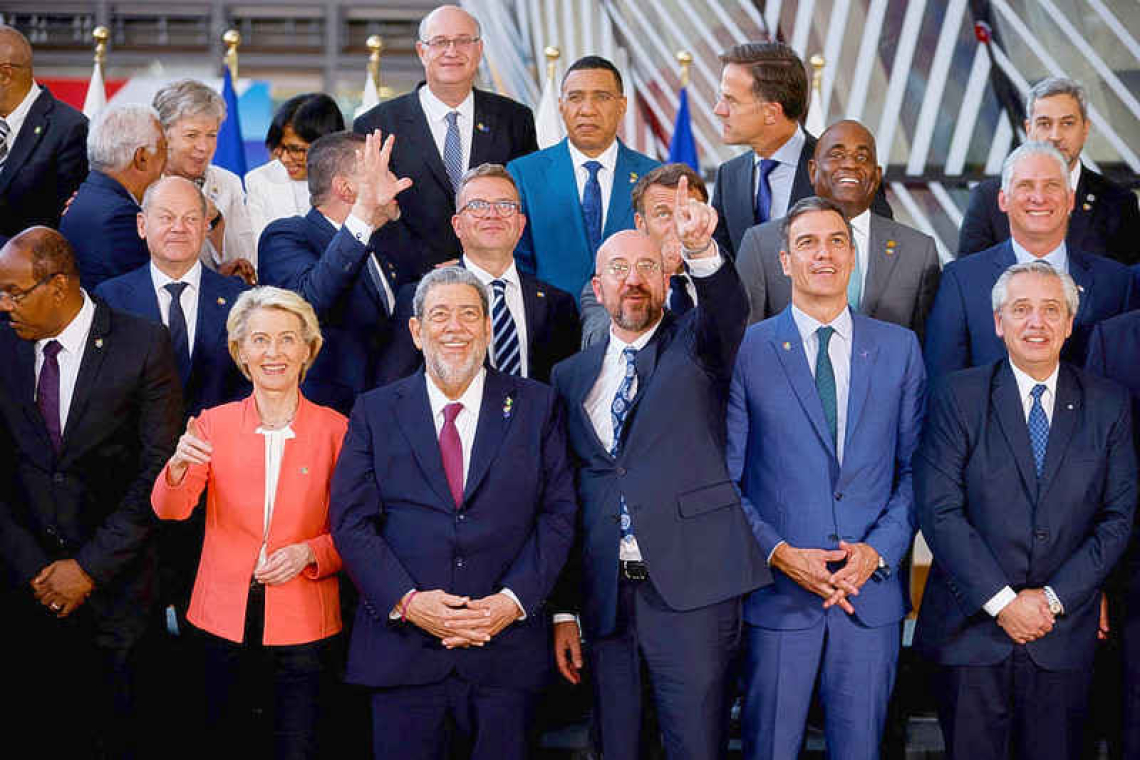Dutch caretaker Prime Minister Mark Rutte (top, third from right) is one of the government leaders of the European Union (EU) and the Community of Latin American and Caribbean States (CELAC) during the summit in Brussels, Belgium, on Monday. Other participants include European Commission President Ursula von der Leyen, European Council President Charles Michel, Spain’s Prime Minister Pedro Sanchez, Argentina’s President Alberto Fernandez, Finland’s Prime Minister Petteri Orpo, Germany’s Chancellor Olaf Scholz and Saint Vincent and the Grenadines Prime Minister and President pro tempore of CELAC Ralph Gonsalves. (Reuters/Johanna Geron photo)
BRUSSELS/THE HAGUE--Dutch caretaker Prime Minister Mark Rutte called for more mutual understanding and support from the Latin American and Caribbean countries at the start of the summit of the European Union (EU) and the Community of Latin American and Caribbean States CELAC in Brussels on Monday and Tuesday.
Rutte is one of the government leaders attending the summit, which started on Monday, to discuss the further strengthening of the EU-CELAC partnership. Strengthening that partnership is highly necessary, said Rutte, because Europe has some making up to do towards Latin America and the Caribbean.
“Often, we did not pick up the telephone when they called us with concerns. Rightfully so, they got irritated now that we need their support,” Rutte told the media. He was referring to the support Europe needs for Ukraine and the fact that Europe is urgently looking for new suppliers of resources that decrease their dependence on China and Russia.
The support from Latin America and the Caribbean is not a given, and there is reluctance to sign a joint declaration about Ukraine. Several countries have accused Europe of a “colonial attitude.” Rutte showed understanding for that criticism.
“This summit is important to have talks with the Latin America and the Caribbean countries. One matter is: how do you get the other countries to support the countries that oppose the terrible aggression war by Russia against Ukraine?” said Rutte, who added that this concerned a mutual interest.
“You need to realise that often in the past, we did not pick up the telephone when Africa called, or today we are talking with Latin America and the Caribbean. So, there is much irritation among many countries. They say: now you need us, but you were not there for us in the past. That is a lesson that we really must learn and have to acknowledge,” Rutte told reporters on the first day of the summit.
“It starts with acknowledging the mistake from our side. We should never make that same mistake again to not actively engage in talks with the rest of the world. For too long, politics in Europe were too much European-focused whereby our interests were often found more important that the interests of other parts of the world. Let’s please not forget that lesson. That we get that thrown back into our face is proof that we assumed a position that was a bit too arrogant.”
However, it is important to still make clear that the support of the Latin American and Caribbean countries is needed for Ukraine, he noted, “because it is a colonising war, the recolonisation of another country; and that touches on our values, our safety.”
The second large topic at the summit is the combating of organised crime; for example, drug trafficking and the Treaty of San José, an agreement with regard to cooperation to combat the transport over sea and by air of narcotics in the Caribbean area.
Responding to a question of the Telegraaf newspaper about the Caribbean parts of the Kingdom, Rutte reiterated that the Netherlands, through the Dutch Caribbean countries, is a neighbour of France, Venezuela and Colombia.
Rutte will meet with various leaders of government while in Brussels, including Suriname and Colombia, to discuss regional matters. Talks are not planned with Venezuela. “The Netherlands is indirectly involved in all kinds of initiatives to see if the situation can be stabilised, but it is very difficult, and there are few direct contacts,” he said.
Asked about the negotiations to arrive at a free trade agreement of the EU with Mercosur, the economic collaboration between Argentina, Brazil, Paraguay and Uruguay, Rutte said he did not expect many developments in that area. He said that for the Netherlands, the conservation of the rain forests, which he referred to as “the lungs of the world,” in South America were very important.
“We are interested in a free trade agreement, but it is of importance that the agricultural products from there enter our market in a fair manner, at fair prices, taking into account the balance between ecology and economy,” he said.







